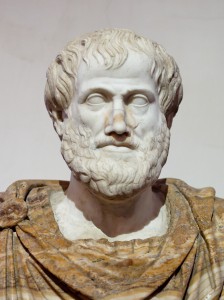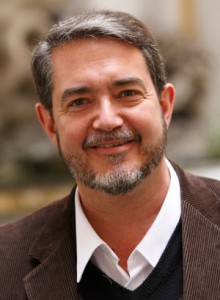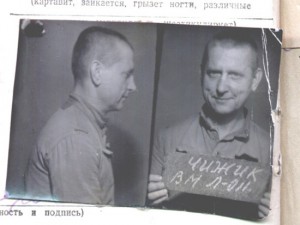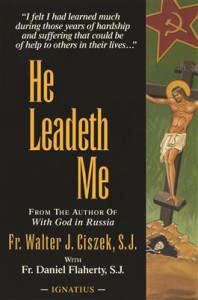Happy Easter, everyone!
Let me ask a question: when you’re depressed or stressed, do you eat more or eat less? One time, after a terrible conversation with a friend, I was so dejected that I completely lost my appetite. Right after this I had an appointment with some other friends and I couldn’t tell them what had just happened. We went for sushi but I had to force myself to eat. I love sushi, but it didn’t taste good.
 Aristotle makes the good observation that when we’re sick, our body doesn’t perceive things well. E.g. When we’ve got the flu, normal, tasty orange juice doesn’t taste good. There’s nothing wrong with the juice, but there’s something wrong with us. (Dr. Janet Smith, Contraception: Cracking the Myths, Track 4, 2:26).
Aristotle makes the good observation that when we’re sick, our body doesn’t perceive things well. E.g. When we’ve got the flu, normal, tasty orange juice doesn’t taste good. There’s nothing wrong with the juice, but there’s something wrong with us. (Dr. Janet Smith, Contraception: Cracking the Myths, Track 4, 2:26).
For me, the daily thermometer for how healthy I am is Mass. When I come to Mass and I’m not joyful and not happy to be here and praying, then something’s wrong. Either I’m upset, have made a mistake, am distracted, or bothered by something. There’s so much goodness in the Mass, but I don’t perceive it.
The prayer after the first reading for the Easter vigil is beautiful: “Almighty ever-living God… may those you have redeemed understand that there exists nothing more marvellous than the world’s creation… except that… Christ… has been sacrificed.”
This is an incredible prayer! There’s so much goodness around us! Life, beauty, nature—you see God’s hand in everything. What’s even better is Jesus’ love for us! He never gives up on us, is always looking for us, always guiding and loving us! And if we don’t perceive that, then perhaps something’s wrong on our end. I’m not saying it’s necessarily our fault; it could be that something is hurting us.
But what we need, what God wants to offer us today is a resurrection of our perception of goodness.
 Among God’s creation, let’s focus on the goodness of three things: 1) When we’re feeling stressed, we should get outdoors (we’re indoors a lot, aren’t we?). There’s always goodness and beauty in nature: in the air, sky, sun, rain, trees, etc. 2) I told you once how a friend of mine tries to sincerely identify the good in every person and affirm it because there’s always something that can be affirmed in everyone. Even in the people who bother us, there’s goodness there. Seeing the goodness explains why he’s always a joyful person. 3) There’s a special goodness in children. Dostoyevsky said: “The soul is healed by being with children.” Someone once shared this quote with a young mother of three and she said, “Bet you Dostoevsky didn’t have any kids or, if he did, his wife was doing the child care.” Despite their faults and sins, children do have an innocence and purity and it’s refreshing.
Among God’s creation, let’s focus on the goodness of three things: 1) When we’re feeling stressed, we should get outdoors (we’re indoors a lot, aren’t we?). There’s always goodness and beauty in nature: in the air, sky, sun, rain, trees, etc. 2) I told you once how a friend of mine tries to sincerely identify the good in every person and affirm it because there’s always something that can be affirmed in everyone. Even in the people who bother us, there’s goodness there. Seeing the goodness explains why he’s always a joyful person. 3) There’s a special goodness in children. Dostoyevsky said: “The soul is healed by being with children.” Someone once shared this quote with a young mother of three and she said, “Bet you Dostoevsky didn’t have any kids or, if he did, his wife was doing the child care.” Despite their faults and sins, children do have an innocence and purity and it’s refreshing.
 When I go visit our school, the students have a box where they put in questions that they want to ask me. Their questions are very refreshing and here are five of my favourite: “Why does a priest need to wear a costume?” “Why isn’t everyone made perfect?” “Why didn’t Jesus use his powers to escape when he was nailed to the cross?” “Do any priests go to hell?” “Fr. Justin, what really bothers you besides people not listening in church?”
When I go visit our school, the students have a box where they put in questions that they want to ask me. Their questions are very refreshing and here are five of my favourite: “Why does a priest need to wear a costume?” “Why isn’t everyone made perfect?” “Why didn’t Jesus use his powers to escape when he was nailed to the cross?” “Do any priests go to hell?” “Fr. Justin, what really bothers you besides people not listening in church?”
More amazing than creation is redemption. Last night, we had 3 adults baptized and 1 received into the Church along with the baptism of 4 children!
 Getting baptized isn’t just about getting sins forgiven, it’s also about getting adopted by God into His family. Scott Hahn puts it this way: once, he had car trouble, took it to shop, had a great mechanic identify two problems. He left the car, went back the next day, picked it up, drove it home, then realized the mechanic had only fixed one of the problems. So he drove back and said, “You fixed this…” and suddenly the mechanic’s eyes got wide and he said, “I never… I forgot, I am so sorry.” Hahn said, “Don, I forgive you.” But notice that he didn’t adopt him, bring him home, write him into his last will and testament along with one of his kids. That’s what Christ does as our redeemer: He doesn’t just pardon us, but brings about an adoption so that we share in His divine Sonship.
Getting baptized isn’t just about getting sins forgiven, it’s also about getting adopted by God into His family. Scott Hahn puts it this way: once, he had car trouble, took it to shop, had a great mechanic identify two problems. He left the car, went back the next day, picked it up, drove it home, then realized the mechanic had only fixed one of the problems. So he drove back and said, “You fixed this…” and suddenly the mechanic’s eyes got wide and he said, “I never… I forgot, I am so sorry.” Hahn said, “Don, I forgive you.” But notice that he didn’t adopt him, bring him home, write him into his last will and testament along with one of his kids. That’s what Christ does as our redeemer: He doesn’t just pardon us, but brings about an adoption so that we share in His divine Sonship.
Picture a convict on death row, guilty of some horrible crime, going to be given a lethal injection. To make matters worse, he’s dying of some terminal illness anyway and he’s only got a day or two left to live, and there’s no known cure. Even if there was he couldn’t pay for it, because he’s broke, in deep debt, and has no family.
Picture him going down the hall towards the injection. The phone rings, he picks it up and he hears the voice of the governor on the other end who says, “I’ve got good news: I’ve granted you a full pardon.” That would be good news. He won’t get executed, but can now go back to his cell and die of natural causes. But, if the governor said, “Not only have I granted you a pardon, but I have an announcement: they’ve just found the cure for your illness, and it’s on its way down to the prison. It’s very expensive, but, don’t worry, I’ve already paid for that. I’ve also paid off all your outstanding debts, and besides that, I filled out adoption papers, there’s a white limo outside the door, you’re coming home, you’re my son.” That would be great news! That’s how we understand the Gospel. Jesus doesn’t just die to redeem us from sin. It’s ultimately a divine adoption, so that we come home into his family—that’s why we make so much out of the Church, the sacraments, the saints who are our older brothers and sisters. God the Father wants to make a family (Scott Hahn, God’s Family & Ours: The Church and the Trinity, Track 11, 1:39). There is overwhelming goodness here!
The greatest gift of redemption is the Eucharist. As I mentioned, when I don’t appreciate the Eucharist, I know I need to grow and something in me is distracting me from the most important sacrament, most important thing in my life.
 Fr. Walter Ciszek, S.J. was an American priest from Pennsylvania who volunteered to go to Russia in 1939 to minister to Catholics in the atheist Soviet Union. When discovered as a priest, he was arrested, sent to prison, and for five years, he couldn’t offer Mass.
Fr. Walter Ciszek, S.J. was an American priest from Pennsylvania who volunteered to go to Russia in 1939 to minister to Catholics in the atheist Soviet Union. When discovered as a priest, he was arrested, sent to prison, and for five years, he couldn’t offer Mass.
Around this time he said, “When I reached the prison camps of Siberia, I learned to my great joy that it was possible to say Mass daily once again. In every camp, the priests and prisoners would go to great lengths… just to have the consolation of this sacrament… Our risk of discovery, of course, was greater in the barracks, because of the lack of privacy and the presence of informers. Most often, therefore, we said our daily Mass somewhere at the work site during the noon break. Despite this added hardship, everyone observed a strict Eucharistic fast from the night before, passing up a chance for breakfast and working all morning on an empty stomach. Yet no one complained. In small groups the prisoners would shuffle into the assigned place, and there the priest would say Mass in his working clothes, unwashed, disheveled, bundled up against the cold… The intensity of devotion of both priests and prisoners made up for everything; there were no altars, candles, bells, flowers, music, snow-white linens, stained glass or the warmth that even the simplest parish church could offer. Yet in these primitive conditions, the Mass brought you closer to God than anyone might conceivably imagine. The realization of what was happening on the board, box, or stone used in the place of an altar penetrated deep into the soul. Distractions caused by the fear of discovery, which accompanied each saying of the Mass under such conditions, took nothing away from the effect that the tiny bit of bread and few drops of consecrated wine produced upon the soul.
 Many a time… the feeling of having performed something tremendously valuable for the people of this Godless country was overpowering. Just the thought of having celebrated Mass here… made my journey to the Soviet Union and the sufferings I endured seem totally worthwhile and necessary. No other inspiration could have deepened my faith more, could have given me spiritual courage in greater abundance… So I never let a day pass without saying Mass; it was my primary concern each new day. I would go to any length, suffer any inconvenience, run any risk to make the bread of life available to these men” (Fr. Walter J Ciszek, SJ, He Leadeth Me).
Many a time… the feeling of having performed something tremendously valuable for the people of this Godless country was overpowering. Just the thought of having celebrated Mass here… made my journey to the Soviet Union and the sufferings I endured seem totally worthwhile and necessary. No other inspiration could have deepened my faith more, could have given me spiritual courage in greater abundance… So I never let a day pass without saying Mass; it was my primary concern each new day. I would go to any length, suffer any inconvenience, run any risk to make the bread of life available to these men” (Fr. Walter J Ciszek, SJ, He Leadeth Me).
Fr. Ciszek was very healthy emotionally, psychologically and spiritually, which is why He could see the goodness around Him—I want to be like this. The most joyful people I know are the ones who see goodness around them. The most virtuous people I know are the ones who see goodness even when things aren’t perfect. Today’s a day to resurrect our seeing of goodness.